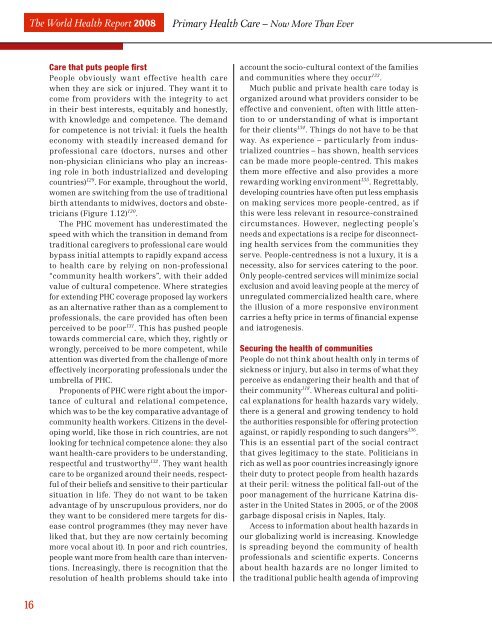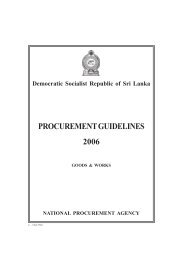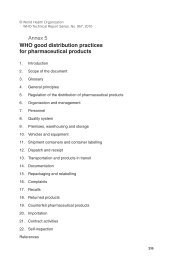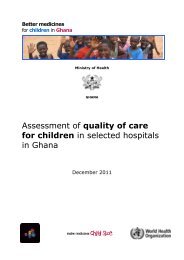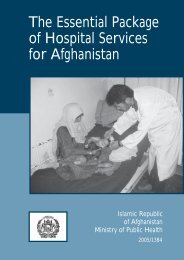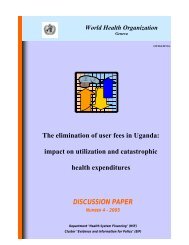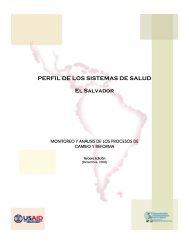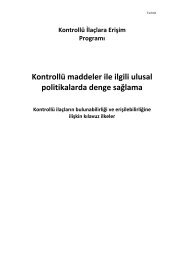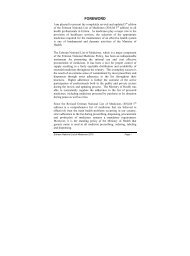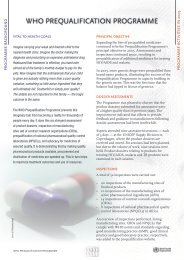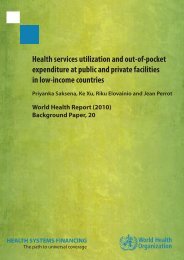Primary health care: now more than ever - World Health Organization
Primary health care: now more than ever - World Health Organization
Primary health care: now more than ever - World Health Organization
Create successful ePaper yourself
Turn your PDF publications into a flip-book with our unique Google optimized e-Paper software.
The <strong>World</strong> <strong>Health</strong> Report 2008<strong>Primary</strong> <strong>Health</strong> Care – Now More Than EverCare that puts people firstPeople obviously want effective <strong>health</strong> <strong>care</strong>when they are sick or injured. They want it tocome from providers with the integrity to actin their best interests, equi tably and honestly,with k<strong>now</strong>ledge and compe tence. The demandfor competence is not trivial: it fuels the <strong>health</strong>economy with steadily increased demand forprofessional <strong>care</strong> (doctors, nurses and othernon-physician clinicians who play an increasingrole in both industrialized and developingcountries) 129 . For example, throughout the world,women are switching from the use of traditionalbirth attendants to midwives, doctors and obstetricians(Figure 1.12) 130 .The PHC movement has underestimated thespeed with which the transition in demand fromtraditional <strong>care</strong>givers to professional <strong>care</strong> wouldbypass initial attempts to rapidly expand accessto <strong>health</strong> <strong>care</strong> by relying on non-professional“community <strong>health</strong> workers”, with their addedvalue of cultural competence. Where strategiesfor extending PHC coverage proposed lay workersas an alternative rather <strong>than</strong> as a complement toprofessionals, the <strong>care</strong> provided has often beenperceived to be poor 131 . This has pushed peopletowards commercial <strong>care</strong>, which they, rightly orwrongly, perceived to be <strong>more</strong> competent, whileattention was diverted from the challenge of <strong>more</strong>effectively incorporating professionals under theumbrella of PHC.Proponents of PHC were right about the importanceof cultural and relational competence,which was to be the key comparative advantage ofcommunity <strong>health</strong> workers. Citizens in the developingworld, like those in rich countries, are notlooking for technical competence alone: they alsowant <strong>health</strong>-<strong>care</strong> providers to be understanding,respectful and trustworthy 132 . They want <strong>health</strong><strong>care</strong> to be organized around their needs, respectfulof their beliefs and sensitive to their particularsituation in life. They do not want to be takenadvantage of by unscrupulous providers, nor dothey want to be considered mere targets for diseasecontrol programmes (they may n<strong>ever</strong> haveliked that, but they are <strong>now</strong> certainly becoming<strong>more</strong> vocal about it). In poor and rich countries,people want <strong>more</strong> from <strong>health</strong> <strong>care</strong> <strong>than</strong> interventions.Increasingly, there is recognition that theresolution of <strong>health</strong> problems should take intoaccount the socio-cultural context of the familiesand communities where they occur 133 .Much public and private <strong>health</strong> <strong>care</strong> today isorganized around what providers consider to beeffective and convenient, often with little attentionto or understanding of what is importantfor their clients 134 . Things do not have to be thatway. As experience – particularly from industrializedcountries – has shown, <strong>health</strong> servicescan be made <strong>more</strong> people-centred. This makesthem <strong>more</strong> effective and also provides a <strong>more</strong>rewarding working environment 135 . Regrettably,developing countries have often put less emphasison making services <strong>more</strong> people-centred, as ifthis were less relevant in resource-constrainedcircumstances. How<strong>ever</strong>, neglecting people’sneeds and expectations is a recipe for disconnecting<strong>health</strong> services from the communities theyserve. People-centredness is not a luxury, it is anecessity, also for services catering to the poor.Only people-centred services will minimize socialexclusion and avoid leaving people at the mercy ofunregulated commercialized <strong>health</strong> <strong>care</strong>, wherethe illusion of a <strong>more</strong> responsive environmentcarries a hefty price in terms of financial expenseand iatrogenesis.Securing the <strong>health</strong> of communitiesPeople do not think about <strong>health</strong> only in terms ofsickness or injury, but also in terms of what theyperceive as endangering their <strong>health</strong> and that oftheir community 118 . Whereas cultural and politicalexplanations for <strong>health</strong> hazards vary widely,there is a general and growing tendency to holdthe authorities responsible for offering protectionagainst, or rapidly responding to such dangers 136 .This is an essential part of the social contractthat gives legitimacy to the state. Politicians inrich as well as poor countries increasingly ignoretheir duty to protect people from <strong>health</strong> hazardsat their peril: witness the political fall-out of thepoor management of the hurricane Katrina disasterin the United States in 2005, or of the 2008garbage disposal crisis in Naples, Italy.Access to information about <strong>health</strong> hazards inour globalizing world is increasing. K<strong>now</strong>ledgeis spreading beyond the community of <strong>health</strong>professionals and scientific experts. Concernsabout <strong>health</strong> hazards are no longer limited tothe traditional public <strong>health</strong> agenda of improving16


